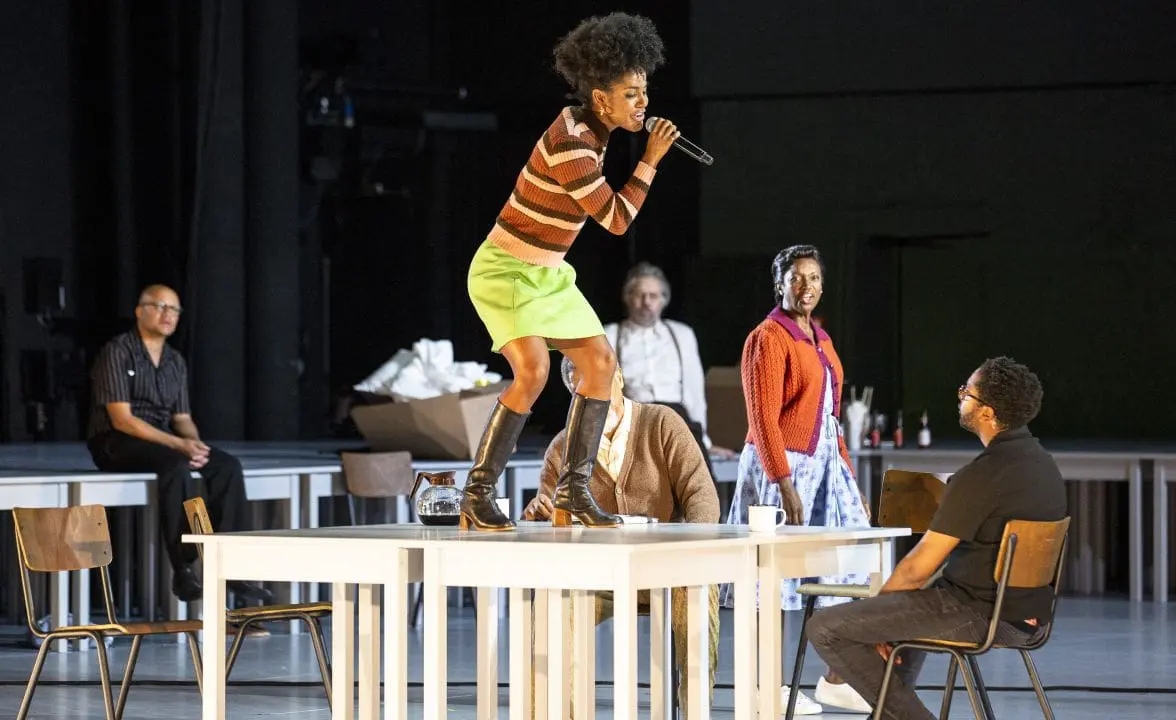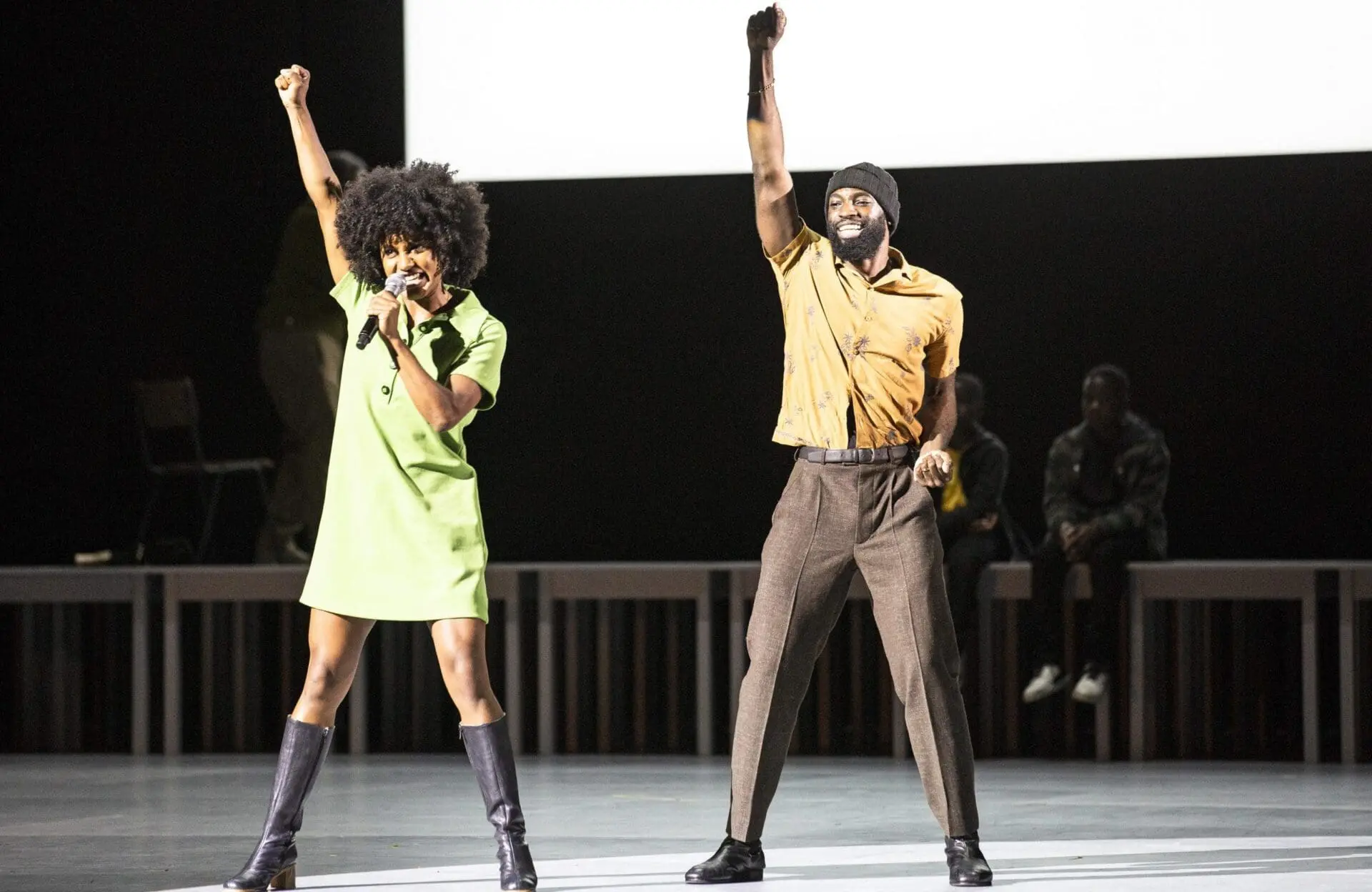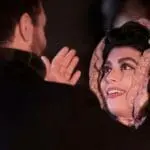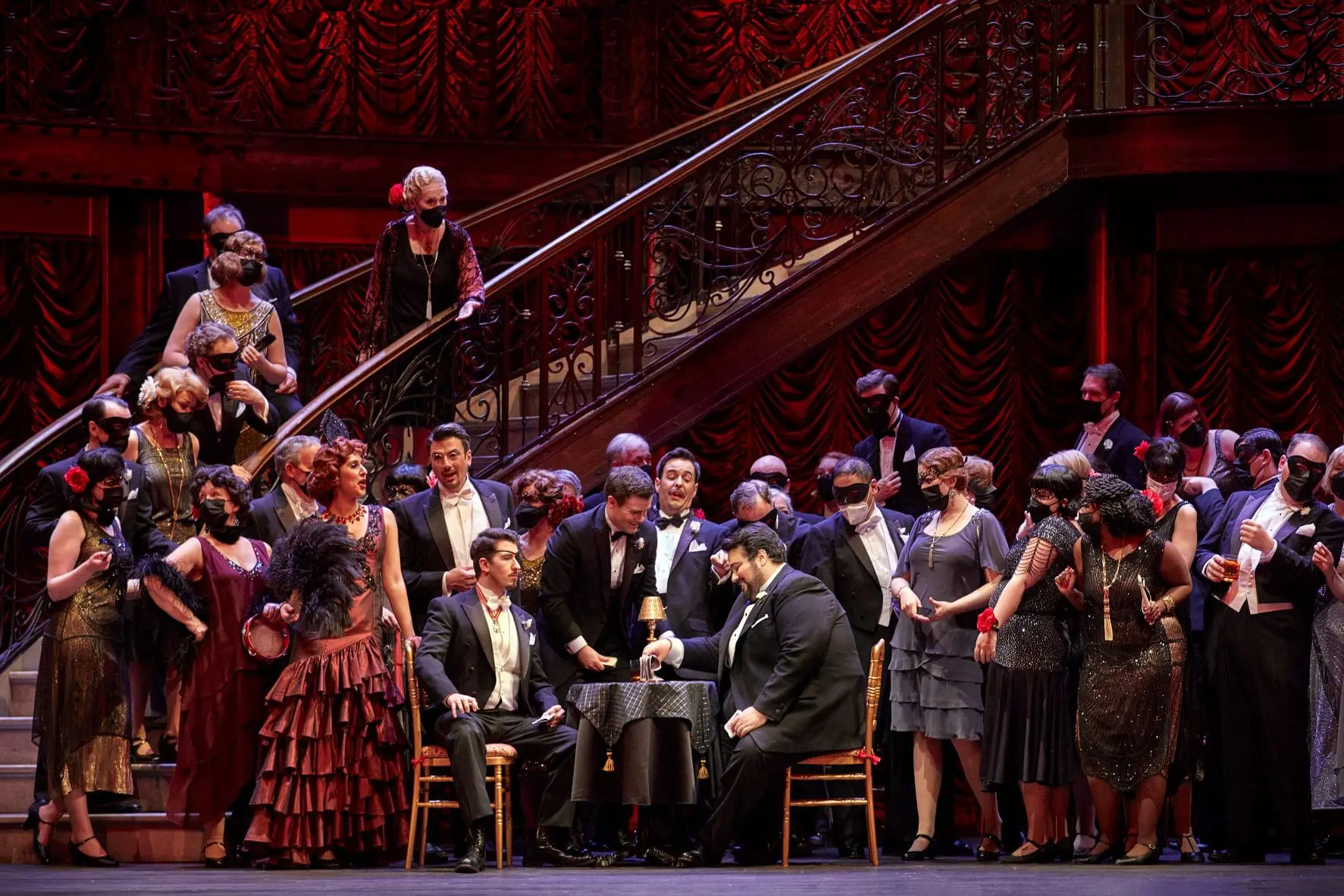Topical, trendy, thought-provoking.
In a nutshell, that’s Belgian avant-garde jazz pianist and composer Kris Defoort’s opera, The Time of Our Singing, which was given its world premiere with eight performances before live, masked audiences at La Monnaie this September after having been postponed from last season due to the pandemic (viewed via the September 24 Operavision.eu livestream).
The Time of Our Singing is Defoort’s third opera for La Monnaie following The Woman Who Walked Into Doors (2001) and House of the Sleeping Beauties (2009), the latter starring Canadian soprano Barbara Hannigan.
Belgian dramaturg Peter van Kraaij’s English language libretto is based on American author Richard Powers’ 2003 novel of the same name. The three-act, two and a half hour opera presents chronological snapshots or episodes of the lives of a fictitious mixed race couple, Delia Daley, a Black American aspiring singer, and David Strom, a German-Jewish physicist, who met and fell in love at Marian Anderson’s Lincoln Memorial Concert on Easter Sunday, 1939. In short order, we encounter Delia’s father, Dr. William Daley, and her biracial children, here already in adulthood, Jonah, a world-famous tenor, Joey, his accompanist, and Ruth, a Black Panther activist.
The opera’s throughline is racism and its effects on the family. Kraaij’s episodes are tied to big-ticket signposts such as Marian Anderson’s aforementioned historic concert, the start of World War Two, the bombing of Hiroshima, the Watts riots, the assassination of Martin Luther King Jr., and the 1992 riots after Rodney King’s savage beating. These and other events were seen and/or heard via Pierre Martin’s video and audio work which drew heavily on archival material.

Abigail Abraham (Ruth) in La Monnaie/De Munt’s production of The Time of Our Singing. Photo: Bernd Uhlig
La Monnaie certainly didn’t spend a mint on Johannes Schütz’s set which consisted of an upright piano surrounded by a semi-circle of wooden tables, a video screen, plus a small number of props that left other details to be filled in by the audience’s imagination.
Stage director Ted Huffman had the characters begin the opera seated on the tables in full view of the audience. From here, they entered and exited the proceedings, and also served as the stage crew. Costume changes were done on stage, again in full view of the audience. Surprisingly, no one seemed to age over the course of the opera’s 53 year timeline. Though characters did pass away—Delia suspiciously in a house fire, David of cancer, William of old age, and tragically at the end, Jonah from injuries sustained at the riots—that didn’t preclude them, save Jonah, from joining the onstage singing after their respective deaths.
Defoort’s score was a stimulating amalgam of contemporary music and jazz without any imitation of the latter’s styles of the 1940s or 1950s. The composer also seamlessly wove in brief quotations from Bach, Purcell, Puccini and others, referencing compositions included in Powers’s novel. Musical highpoints included the jazzy, lighter-than-air groove at the end of Act I Scene II and the quartet sung to vocables at the end of Act I Scene IV which underscored a rosy picture of familial bliss. The one number that brought down the house was “Music for a while,” sung in Act III Scene XIX by three youths along with Jonah and Benoît Giaux’s off-camera Choeurs d’Enfants et de Jeunes de La Monnaie. It initially quoted Purcell before being transformed into an infectious, quasi-Afro-pop number tailor-made for success among top-drawer children’s choirs around the globe.

Canadian conductor Kwamé Ryan leads rehearsal of La Monnaie/De Munt’s production of The Time of Our Singing. Photo: Hugo Segers
In the pit, Canadian-born Kwamé Ryan’s firm conducting helped the 21-piece Orchestre de Chambre de La Monnaie and the four-piece Ensemble de Jazz to bring Defoort’s score to life and ensured that its many details, whether improvised or notated, fell into place. Special mention goes to Mark Turner’s forlorn tenor sax solo in the rhapsodic introduction, drummer Lander Gyselinck’s improvised solo which ushered in Scene X in Act II, and Nicolas Thys’s all-round funky electric bass playing.
American soprano Claron McFadden, who previously worked with Defoort in The Woman Who Walked Into Doors, sang the role of Delia with aplomb, darting up to a high C in her exuberant melisma during Ruth’s “That’s what we did” in Act III. Her Act I Scene II duet, “I’ve known the song my whole life” with Frankfurt-based, British bass-baritone Simon Bailey’s generally even-keeled David Strom was an early highlight.
Cleveland-born bass-baritone Mark S. Doss was a sturdy and highly resonant Dr. Daley.

L-R: Simon Bailey (David Strom) and Claron McFadden (Delia Daley) in La Monnaie/De Munt’s production of The Time of Our Singing. Photo: Bernd Uhlig
South African tenor Levy Sekgapane was a sweet-sounding Jonah while British baritone Peter Brathwaite was a convincing Joey.
In a one-piece green dress, knee high boots, and a big afro, Belgian actress-vocalist Abigail Abraham’s Ruth looked like some bad ass chick with a heart of gold straight out of a 1970s Blaxploitation flick. She held the microphone like a grudge during her electric renditions of “That’s what we did,” “It’s so old, Joey” in Act III Scene XVI, and “I will tell you about my brother” in Act I Scene IV where she also danced and gave the Black Power salute alongside her onstage Black Panther husband, Robert Rider, a mute role portrayed by Hervé Loka Sombo.
Astrakhan-born, Norwegian-trained mezzo Lilly Jørstad was the shapely, hot-to-trot voice teacher, Lisette Soer, who seduced Jonah and after their (non-nude) lovemaking session atop the tables, crassly told him, “I love your people.” Jørstad made child’s play of Defoort’s musical lines, much of which was purposely parodied from vocal warm-ups and voice building exercises.
Though the cast clearly articulated their texts, the non-American accents which crept into the spoken dialogues of Jonah, Lisette and David ought to have been ironed out by the dialogue coach without resorting to corny imitations of, say, a New York or Boston accent. Vulgarities were occasionally heard in the dialogues along with the offensive N-word, the latter out of the mouth of Dr. Daley of all characters, and both Jonah and Ruth lobbed a few F-bombs into the mix.

L-R: Levy Sekgapane (Jonah), Simon Bailey (David Strom), Peter Brathwaite (Joey), and Claron McFadden (Delia Daley) in La Monnaie/De Munt’s production of The Time of Our Singing. Photo: Bernd Uhlig
The onstage pianist was David Zobel, perhaps best known as the collaborative accompanist for Joyce DiDonato among others.
The opera is a co-production between La Monnaie, Switzerland’s Theater St. Gallen, and the LOD muziektheater in Ghent where Defoort has been composer-in-residence since 1998 and where the reference to Jonah’s joining an early music ensemble in that city would be particularly appreciated. However, with race relations, Black Lives Matter, police brutality and the killings of George Floyd and Breonna Taylor still topical and fresh from yesterday’s headlines, Defoort’s The Time of Our Singing just may find itself on the stages of bolder American opera houses sooner rather than later.














